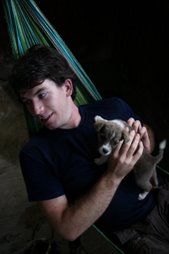I just finished Thomas Mann's Der Zauberberg (The Magic Mountain, tr. John Woods), and without a doubt it is among the five best works of literature that I have ever read. Covering more than 700 densely-packed pages, it is not for the light of heart, but provides ample reward for the tenacious reader. Published in 1924 and winning the Nobel Prize for literature in 1929, The Magic Mountain should reside on your shelf next to The Brothers Karamazov, The Persian Letters, The Sorrows of Young Werther, and East of Eden.
Part of why I found this novel so delightful was that I could closely relate to the ordeal of the protagonist, Hans Castorp, who as a young man finds himself unexpectedly confined to a hospital. In his case, he makes a trip to a sanatorium high in the Swiss Alps to visit his cousin. The patients are all receiving treatment for tuberculosis, and since most have been there for quite a long time, he finds himself in a very different culture than the "flatlands" from which he came. Just before leaving, Castorp asks for a physical exam to determine the cause of a fever which was plaguing him during his stay. But to his disappointment, the doctor finds that he has a mild case of tuberculosis himself! Our poor hero will be staying on for much longer than three weeks he had planned, and not as a guest, but as a patient.
One of the most interesting themes in the novel is the treatment of time. Far up in the mountains, completely removed from the normal iterations of daily life, time takes on a different dimension. Each day is strictly regimented to best facilitate the recovery of patients. The residents move from bedroom, to dining hall, to outdoor "rest cure," and back, in an utterly predictable manner. Far from what one might expect, this apparent tedium does not cause time to slow down, but rather speed up, since each day is nearly indiscernible from all others. Thus, Hans Castcorp learns, his original three week stay is hardly worth mentioning: up here, a month is the smallest measurable unit of time.
Besides our hero, there are two other outstanding characters: Settembrini, a boisterous Italian literary humanist, and Naphta, a sharp-tonged communist Jesuit. Castorp takes on the role of student when listening to the rhetorical fireworks of these bombastic speakers. These three men, along with a cast of other patients with tuberculosis, fill hundreds of pages of fascinating narrative and dialog. Put it on your Christmas list now!
Thursday, November 22, 2007
Subscribe to:
Post Comments (Atom)

No comments:
Post a Comment